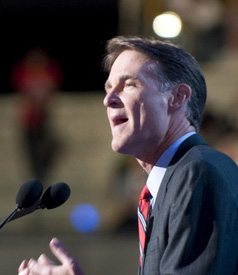Washington – Democrats in Congress are poised to play a leading role this month in thwarting their party’s effort to raise income tax rates on the wealthy.
Tax cuts enacted in 2001 and 2003 expire at the end of this year. President Barack Obama and Democratic congressional leaders have been eager to extend the breaks for individuals who earn less than $200,000 annually and joint filers who make less than $250,000. Those who earn more would pay higher, pre-2001 rates starting next year.
However, a small but growing number of moderate Democrats are balking at boosting taxes on the rich. Many face electorates that recoil at the mention of any tax increase. Some represent areas that are loaded with wealthier taxpayers. Further, some incumbent senators who don’t face voters this fall are reluctant to increase taxes on anyone while the economy remains sluggish.
Without their support, the push to raise rates on the rich probably will fail.
“The economy is very weak right now. Raising taxes will lower consumer demand at a time when we want people putting more money into the economy,” said Sen. Evan Bayh, D-Ind., who isn’t seeking re-election.
Democratic leaders still vow a big effort this month to boost the top tax brackets, now 33 and 35 percent, back to 36 and 39.6 percent, the rates that were in effect in the 1990s. Both House of Representatives Speaker Nancy Pelosi, D-Calif., and Senate Majority Leader Harry Reid, D-Nev., who faces a tough re-election fight, want a vote before the election Nov. 2.
“We still expect to have a bill on the (Senate) floor at some point in September,” Reid spokesman Jim Manley said. “Whether Republicans will allow us to pass anything is a whole other story.”
“The speaker and the president have been clear they want to extend the middle-class tax cuts because they have the greatest economic benefit,” Pelosi spokesman Brendan Daly said.
Many Democrats and Republicans are eager for a tax cut battle, seeing it as emblematic of each party’s economic principles.
“Now the administration is calling for a massive tax hike on small businesses in the middle of a recession,” said Senate Republican leader Mitch McConnell of Kentucky, who maintains that higher rates on the wealthy would hit small business hard, a point the Obama administration disputes.
“So it’s no surprise,” McConnell added, “that most Americans think the country is on the wrong track and that Democrat policies have failed to do anything to fix their top concern, the economy.”
Democratic leaders are convinced that voters won’t buy that argument. Not only will the public back higher taxes for the rich, but “we have an opportunity to generate $700 billion that could go to deficit reduction and badly needed programs,” said Rep. Raul Grijalva, D-Ariz., a co-chairman of the House Progressive Caucus.
The middle class-only extension is thought to have strong support in the House, where Democrats have a huge majority, but some Democrats are reluctant.
Rep. Gerald Connolly, D-Va., represents the northern Virginia suburbs of Washington, one of the nation’s wealthiest districts. Median family income there in 2008 was $117,892, well above the national average of $63,211. He said that repealing the top rates would have political consequences.
“Sometimes we forget how we became the majority. We did it by winning some affluent districts,” he said.
The bigger problem for Democrats looms in the Senate, where Majority Leader Reid’s immediate problem is getting the 60 votes needed to cut off debate on the measure. Democrats control 59 seats, and at least three of them — Bayh, Ben Nelson of Nebraska and Kent Conrad of North Dakota — have signaled that they won’t back a permanent repeal of the tax cuts for the wealthy.
They suggest a way out of a stalemate — temporarily extending all the expiring tax rates — but so far the leadership isn’t going along.
Sean Neary, a spokesman for Senate Budget Committee Chairman Conrad, said the senator backed such an extension “for now.”
“The general rule of thumb is that you do not raise taxes or cut spending during an economic downturn. That would be counterproductive,” Conrad said.
Nelson also offered what’s become the centrist Democratic mantra. He, too, said he’d back extending the tax breaks for the wealthy “for at least a period of time because raising taxes in a weak economy could impair recovery.”
That stand could be even more popular with Democratic candidates for the Senate who aren’t incumbents. The hottest races are in conservative states, such as Kentucky, where Republican Rand Paul and Democrat Jack Conway are battling for the seat now held by Republican Sen. Jim Bunning.
Of the expiring tax cuts for the wealthy, Conway spokeswoman Allison Haley said that he “believes we should extend them now, especially when so many Kentucky families and small businesses are struggling under this recession.”
In Missouri, Republican U.S. Rep. Roy Blunt and Democrat Robin Carnahan are in a tight race. Despite a welcoming embrace with Obama at a Kansas City fundraiser in July, Carnahan said last week that she wanted to extend the Bush tax cuts for everyone.
“Now is not the time to raise taxes,” she said.
In Indiana, U.S. Rep. Brad Ellsworth, D-Ind., who’s seeking to replace Bayh, told the Evansville Courier & Press this summer that all the Bush-era tax cuts should become permanent.
That position makes sense, said Brian Vargus, a professor of political science at Indiana University-Purdue University Indianapolis, because Indiana is “an overwhelmingly Republican state … and there is never support for taxes or public goods.”
Media that fights fascism
Truthout is funded almost entirely by readers — that’s why we can speak truth to power and cut against the mainstream narrative. But independent journalists at Truthout face mounting political repression under Trump.
We rely on your support to survive McCarthyist censorship. Please make a tax-deductible one-time or monthly donation.
